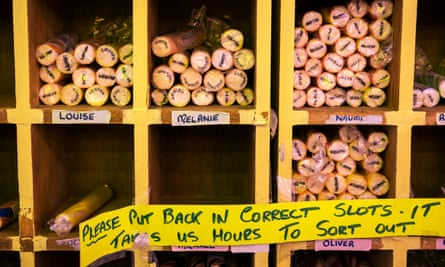Whale mania washed over Skegness and then it washed away again, as sure as the tide. On a bright sunny Thursday after the largest sperm whale stranding since records began, Impulse Tattoo was buzzing with business. Whale tattoos? “Nah,” laughed the tattooist. “Haven’t done any of those.”
The Factory Rock Shop has purchased 30,000 sugar dummies hanging from lanyards reading “Angel” and “The Boss” for the summer season. Any whale-themed sweeties? “You don’t want to be buying stuff just for today, you want to think ahead,” said Hilary Fox.
She’s been selling rock in Skeg – as locals call it – for 47 years. Had the whales been good for business? “There were more people than we’ve ever seen at this time of year.”

When a young male sperm whale became stranded in the shallow waters of Hunstanton, Norfolk, eight days ago, three other members of his pod struggled to the other side of The Wash, dying on the golden beaches of Skegness. A fifth dead whale was found on the mudflats at nearby Friskney.
Skegness’s motto, “It’s so bracing”, backed up by the rapidly spinning blades of huge Lynn and Inner Dowsing windfarm just offshore, does not make this immaculate English seaside town particularly enticing in midwinter. But last Sunday, peak off-season, was as busy as a bank holiday.
“The beach car park was full and the beach was packed,” said Fox. One ice-cream seller opened his kiosk and sold out. This is quite an achievement: Skegness’s stalls typically sell at least 38 varieties, from strawberry kebabs to rainbow slushies.
“They were all eating 99s and looking at dead whales,” said Steve Thornton, having a smoke outside the Skegness Ex-Service Club.
Skegness hit peak whale on Monday. People came from all over to look. One man was photographed wielding a knife in what looked like an attempt to remove a whale’s tooth; another spray-painted “Fukishima RIP [sic]”, “MANS FAULT” and a Mercedes-Benz logo that was probably intended to be the CND symbol on the carcass, claiming he wanted to “get people talking”. One whale “exploded” when scientists examined its intestines, the longest of any animal on the planet.

“On Tuesday the schoolchildren were there in their droves,” said Kath Mous, taking a brisk walk on the seafront. “I can understand that, those kids have got this fantastic opportunity to see a big mammal.”
One local nursery told parents to bring wellies so children could be taken to see the whales. Chloe Holmes was playing on the beach with her one-year-old, Jenson, but didn’t take him to look. “I thought it might be a bit smelly and he would’ve touched it, but they say it’s a really good experience.”

By Wednesday the rapidly decomposing whales were starting to smell and the local authority buried them in sand. Then one or two people started climbing over them.
Seaside towns have always been subversive places, but such scurrilous behaviour seemed to be unrepresentative of wider local sentiment: Skegness was in mourning for its whales. “It’s absolutely devastating,” said Mandy Coleman. “It was heartbreaking to see them laid there like rubber when in the sea they are so agile.”
“We normally come to the beach every day but we didn’t when they were there. Too upsetting,” said Jackie Robinson. Her husband, Mick, added: “I just feel sorry for the whales.”
As well as sadness, everyone felt that to discuss a kind of dead-whale bounce for Skegness’s economy was completely crass. “It’s not the sort of publicity we want,” May Ashton said firmly. “I just didn’t feel it was right to go and gawp at them.”

Skegness’s refusal to cash in on its whales is all the more admirable for the fact that it routinely features in statistical analyses of the most deprived places in Britain. But the birthplace of Butlin’s is far from a traditional seaside resort on the rocks: its shops and amusements are shuttered for the winter rather than boarded up; its seafront, all pale blue lampposts, litter bins and shelters from those bracing easterlies, is immaculate.
“Tourism last year was reasonably buoyant,” said Steve Larner, the town clerk. “Yes we do have areas where there is probably more deprivation than wealthy parts of Lincolnshire. That’s why we’re working hard to try and extend the season and look at events we can put on in late autumn and early spring to draw in the day-trippers.”
Alan Bailey, community manager at the Storehouse church, said it was “a town of two halves”. The church provided 14,000 meals via its foodbank in 2015; Skegness’s winter population is only 22,000. “It’s a seasonal town, with a lot of zero-hours contracts. Everybody’s in; everybody’s out,” he said.

“I think business is doing well but there is an underbelly of poverty. It’s in one of the largest rural areas in England, there are no universities nearby, no public sector jobs, so education tends to be lower, housing standards tend to be lower. But there’s some good stuff going on – the town partnership is doing some good work, Lidl has just opened their flagship store and there’s a new hotel coming.”
Skegness likes to keep things tidy. By Thursday its three whales had been hauled off to landfill, although the fifth whale remained on the mudflats at Friskney, a sad, submarine-sized presence on the horizon. From the sea bank beyond a former Ministry of Defence watch tower, it appeared as a dark hulk against the wide sky, surrounded by the skeletons of three shipwrecks.
Everyone was still talking about these charismatic animals but, on Skegness’s sands, the whales’ only legacy was a rumpled patch of whale blood. A pungent smell, like meaty fish food, still hung in the air.
Here, finally, was an exuberant moment of whale mania. A white dog rolled, delightedly, in the stinky sand. “Arthur!” shouted his owner, Lisa Pearson. “He’s going to smell of whale, just like he did yesterday.”

